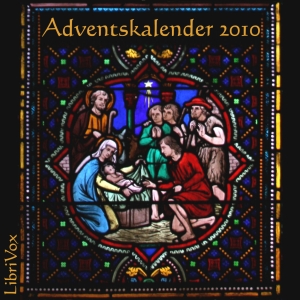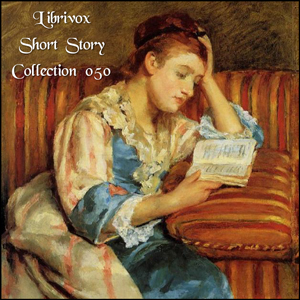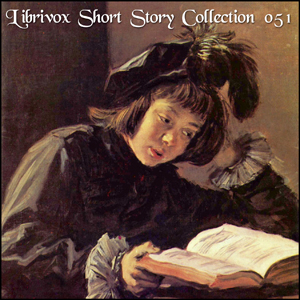What do you do for a fifth anniversary? We decided to have a collection of short works with a difference. We challenged our readers to find any short works which had 'five' in the title - in any language. They have done us proud, and the collection extends to three volumes of short stories, poems, fairy tales, memoirs, non-fiction and bible readings, in six languages. This is the second volume. (Summary by Ruth Golding)
See also Volume 1 & Volume 3.
20 episodes
Before becoming the author of such classics as Sense and Sensibility, Pride and Prejudice, and Emma, Jane Austen experimented with various writing styles as a teenager in the early 1790s. This is a collection of her juvenilia, including the epistolary novels Love and Freindship, Lesley Castle, and Lady Susan, as well as her comic History of England and some shorter pieces. (Summary by Elizabeth Klett)
18 episodes
What do you do for a fifth anniversary? We decided to have a collection of short works with a difference. We challenged our readers to find any short works which had 'five' in the title - in any language. They have done us proud, and the collection extends to three volumes of short stories, poems, fairy tales, memoirs, non-fiction and bible readings, in six languages. This is the third volume. (Summary by Ruth Golding)
See also Volume 1 & Volume 2.
15 episodes
This is a collection of short humorous works first published before 1923. (Summary by BellonaTimes)
15 episodes
LibriVox’s Short Story Collection 046: a collection of 20 short works of fiction in the public domain read by a group of LibriVox members.
20 episodes
Diese Sammlung umfasst 15 deutschsprachige Prosa-Texte verschiedener Genres.
"Vom Schweigen" übersetzt von Gustav Landauer (1870-1919)
15 episodes
Pretty but socially clueless Bernice lets her know-it-all cousin push her around, but eventually, something's gotta give! (Introduction by BellonaTimes)
2 episodes
Contos Fluminenses, originalmente publicado em 1870, e Histórias da Meia-Noite, publicado em 1873, são os dois primeiros livros de contos de Machado de Assis, famoso escritor brasileiro. Nestes livros encontram-se alguns de seus contos que viriam a se tornar clássicos da literatura brasileira, como Miss Dollar e Ponto de Vista. (Sumário escrito por Leni)
14 episodes

Esopo é um lendário autor grego, que teria vivido na Antigüidade, ao qual se atribui a paternidade da fábula como gênero literário. As Fábulas de Esopo serviram como base para recriações de outros escritores ao longo dos séculos, como Fedro e La Fontaine. O local de seu nascimento é incerto — Trácia, Frígia, Etiópia, Samos, e Sardes todas clamam a honra. Eventualmente morreu em Delfos. Na verdade, todos os dados referentes a Esopo são discutíveis e trata-se mais de um personagem lendário do que histórico. A única certeza é que as fábulas a ele atribuídas foram reunidas pela primeira vez por Demétrio de Falero, em 325 a.C..
Esopo teria sido um escravo, que foi libertado pelo seu dono, que ficou encantado com suas fábulas. Ao que tudo indica, viajou pelo mundo antigo e conheceu o Egito, a Babilónia e o Oriente. Concretamente, não há indícios seguros de que tenha escrito qualquer coisa.
Entretanto, foi-lhe atribuído um conjunto de pequenas histórias, de carácter moral e alegórico, cujos papéis principais eram desenvolvidos por animais. Na Atenas do século V a.C., essas fábulas eram conhecidas e apreciadas.
As fábulas que lhe são atribuídas sugerem normas de conduta que são exemplificadas pela ação dos animais (mas também de homens, deuses e mesmo coisas inanimadas). Esopo partia da cultura popular para compor seus escritos. Os seus animais falam, cometem erros, são sábios ou tolos, maus ou bons, exatamente como os homens. A intenção de Esopo, em suas fábulas, era mostrar como os seres humanos podiam agir, para bem ou para mal.
Assim como Homero, as fábulas de Esopo faziam parte da tradição oral dos gregos, por isso não foram escritas pelo seu suposto autor. Mais de duzentos anos depois da suposta morte de Esopo é que as fábulas foram reunidas e escritas.
(Adaptado da wikipedia por Vicente)
31 episodes
Diese Sammlung ist ein Adventskalender und enthält ein Türchen für jeden Tag vom 1. bis zum 24. Dezember.
24 episodes
This multilingual Christmas Short Works Collection for 2010 contains public domain short stories, essays, poems and scripture passages recorded by a variety of LibriVox members in English, German and Portuguese.
27 episodes

Esopo é um lendário autor grego, que teria vivido na Antigüidade, ao qual se atribui a paternidade da fábula como gênero literário.
As Fábulas de Esopo serviram como base para recriações de outros escritores ao longo dos séculos, como Fedro e La Fontaine.
Fabulista grego do século VI a.C.. O local de seu nascimento é incerto — Trácia, Frígia, Etiópia, Samos, e Sardes todas clamam a honra. Eventualmente morreu em Delfos. Na verdade, todos os dados referentes a Esopo são discutíveis e trata-se mais de um personagem lendário do que histórico.
A única certeza é que as fábulas a ele atribuídas foram reunidas pela primeira vez por Demétrio de Falero, em 325 a.C..
Esopo teria sido um escravo, que foi libertado pelo seu dono, que ficou encantado com suas fábulas. Ao que tudo indica, viajou pelo mundo antigo e conheceu o Egito, a Babilónia e o Oriente. Concretamente, não há indícios seguros de que tenha escrito qualquer coisa.
Entretanto, foi-lhe atribuído um conjunto de pequenas histórias, de carácter moral e alegórico, cujos papéis principais eram desenvolvidos por animais. Na Atenas do século V a.C., essas fábulas eram conhecidas e apreciadas.
As fábulas que lhe são atribuídas sugerem normas de conduta que são exemplificadas pela ação dos animais (mas também de homens, deuses e mesmo coisas inanimadas). Esopo partia da cultura popular para compor seus escritos. Os seus animais falam, cometem erros, são sábios ou tolos, maus ou bons, exatamente como os homens. A intenção de Esopo, em suas fábulas, era mostrar como os seres humanos podiam agir, para bem ou para mal.
Assim como Homero, as fábulas de Esopo faziam parte da tradição oral dos gregos, por isso não foram escritas pelo seu suposto autor. Mais de duzentos anos depois da suposta morte de Esopo é que as fábulas foram reunidas e escritas.
(Adaptado da wikipedia por Vicente)
30 episodes
LibriVox’s Short Story Collection 047: a collection of 20 short works of fiction in the public domain read by a group of LibriVox members, including stories by Poul Anderson, Aphra Behn, Kate Chopin, Joseph Conrad, Thomas Hardy, Bret Harte, O. Henry, Oliver Wendell Holmes, Franz Kafka, Rudyard Kipling, Jack London, Lucy Maud Montgomery and Wilbur D. Nesbit.
20 episodes
Short sketches relating the humourous side of life in 1910. "Professor Leacock has made more people laugh with the written word than any other living author. One may say he is one of the greatest jesters, the greatest humorist of the age." – A. P. Herbert (Summary by TriciaG and Wikipedia)
41 episodes
Diese Sammlung umfasst 15 deutschsprachige Prosa-Texte verschiedener Genres.
15 episodes

Apart from "Rip Van Winkle" and "The Legend of Sleepy Hollow" - the pieces which made both Irving and The Sketch Book famous - other tales include "Roscoe", "The Broken Heart", "The Art of Book-making", "A Royal Poet", "The Spectre Bridegroom", "Westminster Abbey", "Little Britain", and "John Bull". His stories were highly influenced by German folktales, with "The Legend of Sleepy Hollow" being inspired by a folktale recorded by Karl Musäus. Stories range from the maudlin (such as "The Wife" and "The Widow and Her Son") to the picaresque ("Little Britain") and the comical ("The Mutability of Literature"), but the common thread running through The Sketch Book — and a key part of its attraction to readers — is the personality of Irving's pseudonymous narrator, Geoffrey Crayon. Erudite, charming, and never one to make himself more interesting than his tales, Crayon holds The Sketch Book together through the sheer power of his personality - and Irving would, for the rest of his life, seamlessly enmesh Crayon's persona with his own public reputation. (Introduction by Wikipedia)
36 episodes
The Happy Prince and Other Tales (also sometimes called The Happy Prince and Other Stories) is an 1888 collection of stories for children by Oscar Wilde. It is most famous for The Happy Prince, the short tale of a metal statue who befriends a migratory bird. Together, they bring happiness to others, in life as well as in death.
The stories included in this collection are:
The Happy Prince
The Nightingale and the Rose
The Selfish Giant
The Devoted Friend
The Remarkable Rocket
The stories convey an appreciation for the exotic, the sensual and for masculine beauty. (summary from Wikipedia.)
5 episodes
Diese Sammlung umfasst 15 deutschsprachige Prosa-Texte verschiedener Genres.
"Die Blumen der kleinen Ida" übersetzt von Paul Arndt
15 episodes
This is Edith Wharton's earliest published collection of short stories (1899). Like much of her later work, they touch on themes of marriage, male/female relationships, New York society, and the nature and purpose of art. One of the stories, "The Twilight of the God," is written as a short play. The role of Warland is read by mb, and the role of Oberville by Bruce Pirie. (Summary by Elizabeth Klett)
8 episodes
This is Edith Wharton's second published collection of short stories (1901). One of these seven stories, "Copy: A Dialogue," is written as a short play. The role of Hilda is read by Arielle Lipshaw, and the role of Ventnor by Mark F. Smith. (Summary by Elizabeth Klett)
8 episodes
A collection of nine enchanting short stories filled with curious beasts and unexpected endings. Included are The Bee-Man of Orn; The Griffin and the Minor Canon; Old Pipes and the Dryad; The Queen's Museum; Christmas Before Last: Or, The Fruit of the Fragile Palm; Prince Hassak's March; The Battle of the Third Cousins; The Banished King; and The Philopena(summary by Gryphon Perkins)
9 episodes

Adeline Virginia Woolf was an English author, essayist, publisher, and writer of short stories, regarded as one of the foremost modernist literary figures of the twentieth century. During the interwar period, Woolf was a significant figure in London literary society and a member of the Bloomsbury Group. Her most famous works include the novels Mrs. Dalloway (1925), To the Lighthouse (1927), and Orlando (1928), and the book-length essay A Room of One's Own (1929), with its famous dictum, "A woman must have money and a room of her own if she is to write fiction."The slim book Monday or Tuesday offers an excursion into Virginia Woolf's early excursions in "stream of consciousness" writing she was to become famous for; including her so-termed "Moments of being," in a format of a collection of short stories mainly concerned with people's thoughts as well as psychology in general, the human and particularly female condition, and aesthetics which inspired and engaged her much of the time helping other writers to find publication through her and her husband Leonard Woolf's "Hogarth Press." (Summary from Wikipedia and LizMourant)
8 episodes

Esopo é um lendário autor grego, que teria vivido na Antigüidade, ao qual se atribui a paternidade da fábula como gênero literário.
As Fábulas de Esopo serviram como base para recriações de outros escritores ao longo dos séculos, como Fedro e La Fontaine.
Fabulista grego do século VI a.C.. O local de seu nascimento é incerto — Trácia, Frígia, Etiópia, Samos, e Sardes todas clamam a honra. Eventualmente morreu em Delfos. Na verdade, todos os dados referentes a Esopo são discutíveis e trata-se mais de um personagem lendário do que histórico.
A única certeza é que as fábulas a ele atribuídas foram reunidas pela primeira vez por Demétrio de Falero, em 325 a.C..
Esopo teria sido um escravo, que foi libertado pelo seu dono, que ficou encantado com suas fábulas. Ao que tudo indica, viajou pelo mundo antigo e conheceu o Egito, a Babilónia e o Oriente. Concretamente, não há indícios seguros de que tenha escrito qualquer coisa.
Entretanto, foi-lhe atribuído um conjunto de pequenas histórias, de carácter moral e alegórico, cujos papéis principais eram desenvolvidos por animais. Na Atenas do século V a.C., essas fábulas eram conhecidas e apreciadas.
As fábulas que lhe são atribuídas sugerem normas de conduta que são exemplificadas pela ação dos animais (mas também de homens, deuses e mesmo coisas inanimadas). Esopo partia da cultura popular para compor seus escritos. Os seus animais falam, cometem erros, são sábios ou tolos, maus ou bons, exatamente como os homens. A intenção de Esopo, em suas fábulas, era mostrar como os seres humanos podiam agir, para bem ou para mal.
Assim como Homero, as fábulas de Esopo faziam parte da tradição oral dos gregos, por isso não foram escritas pelo seu suposto autor. Mais de duzentos anos depois da suposta morte de Esopo é que as fábulas foram reunidas e escritas.
(Adaptado da wikipedia por Vicente)
32 episodes
"Are you wishing sometimes that you had a good book which you don't know, that you might just read and enjoy? The goal of this collection is to introduce you to as many books as possible. Some are well known, some are not." Summary by Stav Nisser.
20 episodes
Flappers and Philosophers was the first collection of short stories written by F. Scott Fitzgerald, published in 1920. It includes eight stories:
* "The Offshore Pirate"
* "The Ice Palace"
* "Head and Shoulders"
* "The Cut-Glass Bowl"
* "Bernice Bobs Her Hair"
* "Benediction"
* "Dalyrimple Goes Wrong"
* "The Four Fists"
(Introduction by Wikipedia)
8 episodes
This is a bilingual project. The first part, in Hebrew, is the story "Injustice" by Yosef Haim Brenner, written following the conquest of Palestine by the British troops during WWI. The story takes place on the Turkish side of the dividing line between the combating forces. An escaped British prisoner of war had taken shelter among a group of Jewish workers, who, following a heated discussion, turned him over to the Turkish army. The second part of this project, in English, is a chapter in the book "The Escaping Club," written in 1922 by the same British prisoner of war, the aviator A. J. Evans, who gave his account of the same event. (Summary by Omri Lernau)
6 episodes
The $30,000 Bequest and Other Stories is a 1906 collection of 30 comic short stories by American humorist and writer Mark Twain. Published just 4 years before his death, this was the last time he chose works from throughout his career, in an effort to show the diversity of his style and the breadth and depth of his interests. (Introduction by John Greenman & Wikipedia )
41 episodes
Wessex Tales is a collection of six short stories written by Hardy in the 1880’s. If you’ve never read Hardy they’ll serve as a good introduction to his writing. Though not as comprehensive as his major works they do contain all the ingredients that make him instantly recognisable. (Introduction by T. Hynes.)
33 episodes
What do you do for a sixth anniversary? We challenged our readers to find any short works which had 'six' in the title - in any language. The result? LibriVox in all its glorious diversity: sixty-six recordings of poetry, song, short stories, folktales, science fiction, historical documents, travel, art, science and mathematics, in Dutch, English, French and German, from Euclid to the Ziegfeld Follies. (Summary by Ruth Golding)
66 episodes
A collection of short stories of social commentary, tales of love, mystery, and loss. Many of the stories revolve around children, women, and relationships with friends of varying classes, often in odd, unusual, or difficult circumstances in life. (Introduction by Psudonae Vox)
14 episodes
LibriVox’s Short Story Collection 050: a collection of 20 short works of fiction in the public domain read by a group of LibriVox members.
20 episodes
Prince Stepan Kasatsky experiences a disappointment with his fiancé and decides to become a monk! There is a story line, but beneath it, Father Sergius struggles to find peace and, if not happiness, then at least contentment. But he is always disillusioned and ultimately unsatisfied. Only in the end does he find his way by letting go of what he struggled to attain all his life, i.e. to be better than everyone else in whatever he did, and settle for the mundane. (Summary by JCarson)
2 episodes
Bartleby, the Scrivener: A Story of Wall Street is a novella by the American novelist Herman Melville (1819–1891). It first appeared anonymously in two parts in the November and December 1853 editions of Putnam's Magazine, and was reprinted with minor textual alterations in his The Piazza Tales in 1856. ( Summary by Wikipedia )
4 episodes
This year's Christmas feast of short stories, essays and poetry is mostly English cuisine, with a little dash of French and Middle English seasoning. Here you will find many old favourites, and some festive treats which may be new to you.
29 episodes
This is a collection of ten humorous short stories (Summary by Carolin)
20 episodes
In this collection of short stories, Susan Glaspell examines the unique character of America and its people. (Summary by wildemoose)
13 episodes
LibriVox’s Short Story Collection 051: a collection of 20 short works of fiction in the public domain read by a group of LibriVox members.
20 episodes

The Charles Dickens 200th Anniversary Collection comprises short works previously unrecorded for LibriVox - fiction, essays, poetry, letters, magazine articles and speeches - and each volume will be a pot pourri of all genres and periods of his writing. This first volume was released on Dickens' 200th birthday, February 7th 2012 and further volumes followed during the anniversary year.Volume 1 includes short stories including, amongst others, The Holly Tree, the first part of Holiday Romance and three pieces from Mugby Junction.Some items requiring a little further explanation are Prince Bull, written as a fairy tale, but in reality a scathing attack on the Government's handling of supplies to the troops in the Crimean War; Old Lamps for New Ones in which Dickens makes clear his low opinion of the ethos of the Pre-Raphaelite school of painting; and Frauds on the Fairies, a polemic against George Cruikshank's bowdlerisation of fairy tales for moralistic purposes, and the interesting revelation that 'product placement' is by no means a new phenomenon. (Introduction by Ruth Golding)
20 episodes
This year is the 200th anniversary of Dickens' birth. This is the second volume; the first volume of short works - fiction, essays, poetry and speeches, previously unrecorded for LibriVox, was catalogued on Dickens' birthday, February 7th 2012, and further volumes followed during the anniversary year. (Summary by Ruth Golding)
20 episodes
2012 is the 200th anniversary of Dickens' birth. This is the third volume of this collection, which aimed to catalogue as many as possible of Dickens' short works which had not previously been recorded for LibriVox. (Summary by Ruth Golding)
20 episodes
The Autobiography of a Slander exposes the consequences of reckless words or, even worse, intentionally disparaging words. In this moral tale, told from the point of view of "the slander", Edna Lyall (pseudonym used by Ada Ellen Bayley) reveals her ideals and goals in life and relationships. (Summary by Rhonda Federman)
8 episodes
2012 was the 200th anniversary of Dickens' birth. This is the fourth volume; the first volume of short works - fiction, essays, poetry and speeches, previously unrecorded for LibriVox, was catalogued by Dickens' birthday on February 7th 2012. Further volumes were added during the anniversary year. (Summary by Ruth Golding)
20 episodes
Boule de Suif (1880) is a short story by the late-19th century French writer Guy de Maupassant. It is arguably his most famous short story, and is the title story for his collection on the Franco-Prussian War, entitled "Boule de Suif et Autres Contes de la Guerre" ("Boule de Suif and Other Stories of the War"). John Ford said that his film Stagecoach was in many ways a western rewrite of Boule de Suif. (Summary by Wikipedia)
3 episodes
2012 was the 200th anniversary of Dickens' birth. This is the fifth and last volume; the first volume of short works - fiction, essays, poetry and speeches, previously unrecorded for LibriVox, was catalogued by Dickens' birthday on February 7th 2012, and further volumes followed throughout the anniversary year. (Summary by Ruth Golding)
20 episodes
Four stories: The Insanity of Jones, The Man Who Found Out, The Glamour of the Snow, and Sand. Tales by one the greatest practitioners of supernatural literature. Reincarnation, the Occult, and mystery. (Summary by Stephen Harris)
17 episodes
New Arabian Nights is a collection of short stories which include Robert Louis Stevenson's earliest fiction as well as those considered his best work in the genre. The first and longest story stars Prince Florizel of Bohemia who appears in the later collection of stories "More New Arabian Nights: The Dynamiter." (Summary by Don W. Jenkins)
25 episodes
Simply put, this is a book of 9 short vignettes each of which describes a different scenario which demonstrates the age old adage: 'where there's a will, there's a way'. (Summary by Roger Melin)
9 episodes
Twenty-two short stories by Arnold Bennett, mainly set in the 'Five Towns', Bennett's name for the pottery manufacturing towns of the English midlands (Summary by Andy Minter).
23 episodes
Novelle per un anno è una raccolta di 241 novelle scritte da Luigi Pirandello. Originariamente sono state pubblicate sul Corriere della Sera, successivamente ripubblicate in 15 raccolte. Inizialmente erano previste 24 raccolte contenenti 365 novelle, tuttavia la prematura morte dell'autore ha impedito il raggiungimento del traguardo. Postume sono state pubblicate altre novelle scritte dall'autore. Le raccolte sono state pubblicate tra il 1922 e il 1938. La settima raccolta, edita nel 1924, contiene novelle pubblicate tra il 1897 ed il 1923. (Riassunto di Filippo Gioachin)Nota: Per motivi di diritti d'autore negli Stati Uniti, alcune novelle sono state rimosse da questa raccolta. Gli abitanti di nazioni ove i diritti d'autore su quest'opera sono già cessati possono trovare le novelle mancanti su Legamus.euQuesto libro è stato promosso dal gruppo Volontari del Libro di aNobii.
16 episodes
These 22 stories are told by the Goblin to the King Vikram. King Vikram faces many difficulties in bringing the vetala to the tantric. Each time Vikram tries to capture the vetala, it tells a story that ends with a riddle. If Vikram cannot answer the question correctly, the vampire consents to remain in captivity. If the king answers the question correctly, the vampire would escape and return to his tree. In some variations, the king is required to speak if he knows the answer, else his head will burst.
This work is taken from baital pachisi and one of its oldest recensions is found incorporated in the Kathā-Sarit-Sāgara ("Ocean of the Streams of Story"), a work in Sanskrit compiled in the 11th century by Somadeva. (Wikipedia)
24 episodes

















































